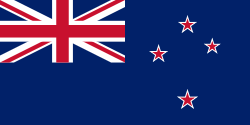| New Zealand at the Commonwealth Games | |
|---|---|
 | |
| CGF code | NZL |
| CGA | New Zealand Olympic Committee |
| Website | www |
| Medals Ranked 5th |
|
| Commonwealth Games appearances (overview) | |
New Zealand has competed in all of the Commonwealth Games since the first in 1930, and has won a total of 656 medals including 159 gold.
Contents
The New Zealand Olympic Committee (known as The New Zealand Olympic and Commonwealth Games Association prior to 1994) is the body in New Zealand responsible for selecting Athletes to represent New Zealand at the Commonwealth Games. The NZOC is a member of the Commonwealth Games Federation.
In 1978, Nigeria boycotted the Commonwealth Games in protest at New Zealand's continued relations, including sporting contacts, with apartheid-era South Africa.
